- Home
- Allison Brennan
Carnal Sin Page 4
Carnal Sin Read online
Page 4
Or get her killed.
TWO
After seventeen years on the force, the last nine as detective, Detective Grant Nelson trusted his gut instincts. They were rarely wrong. While he would wait for the evidence, Grant was confident that the death of George Erickson was the result of sex games turned deadly.
Grant assessed the murder scene. Private home in upscale Westwood, wife out for the night with friends, bedroom set up for a romantic tryst with candles, champagne, and the sultry voice of Patsy Cline playing in the background.
And of course the dead guy, on his back buck naked on the fully made bed, with no visible cause of death. Heart attack or OD; Grant opted for heart attack because there was no vomit or signs of violent convulsions, no obvious signs of drug use or abuse. Did the mistress panic and bail? If so, they’d probably pick up her prints. Or did Erickson collapse from the exhaustion of his sexcapade? Walk the woman out, then drop dead of a heart attack? Or maybe the wife caught him sleeping off a drunk, realized she hadn’t been the recipient of the mood music and champagne, and suffocated him with a pillow. Whichever scenario, they had some legwork ahead of them to put together the pieces. This was the part of police work Grant enjoyed—the puzzle.
“Only one glass of champagne.” Grant’s new partner, Jeff Johnston, walked slowly around the room. Johnston, who looked like the football lineman he’d been in college, had been a uniformed officer in the Devonshire Division before his recent promotion. He peered into the trash can in the corner. “Scratch that. There’s another glass in a million pieces. Think CSI can put Humpty Dumpty back together again and print it?”
Grant stared at the shattered crystal. Why toss the glass? Another puzzle piece for him to fit. Not reporting the death is one thing; covering up her identity quite another. Could be a hooker with a rap sheet.
CSI and the deputy coroner arrived. Grant and Jeff left them to process the scene while they sought out the deceased’s wife. Officer Ann Timmons had been consoling Mrs. Pamela Erickson. She stood and approached them when Grant and Jeff entered the living room.
She rolled her eyes. “Good luck.”
Odd, Grant thought as Timmons met up with her partner on the front porch.
Pamela Erickson was pretty—though on the skinny side—with red-rimmed eyes and her long brown hair up in the back. She was pissed off.
“Who’s the bimbo that walked out on my husband?” she demanded. “What woman does that? Walks out on someone who’s dying?”
Grant sized her up. He’d interviewed hundreds of next-of-kin and he’d seen all sorts of reactions to death. But this was a shade different. Why did the wife assume Erickson was dying while his mistress was still in the room?
“We don’t know for certain that anyone was here with your husband,” he said, though he didn’t believe that for a minute. “Or, if someone was here, whether Mr. Erickson was dead before or after she left.”
She stared at him. “You can’t be that dense—I found him. I saw the bedroom. Someone was with George last night and it wasn’t me!”
“Did you know your husband was having an affair?”
She laughed, a tinge of bitterness lacing her humor. “He wasn’t having an affair. He was fucking around. Of course I knew it. He wouldn’t screw around behind my back.”
Swingers. Married couples who had an agreement they’d sleep around. Grant knew something about that. He’d never seen it end well—it sure as hell hadn’t worked for him and his failed marriage—but it was accepted practice these days among the movers and shakers in L.A., and had spread to suburbia. “Do you know who he was with last night?”
“No.”
“And I’m guessing you weren’t out with friends?”
She glared at him. “I’m not going to be judged by a cop on how George and I lived. We respected each other, which is a hell of a lot more than I can say about some marriages!”
“If there’s anything suspicious about your husband’s death,” Grant said, “I’ll need to verify your alibi.”
It may have hit Pamela Erickson at that moment that maybe her husband hadn’t died of natural causes. Her lower lip trembled and she swallowed, looking from Grant to Jeff and back to Grant. “Someone hurt him on purpose? B-But, George?”
“Was he well liked?”
“Everyone loved George! He’s the nicest guy on the planet. He makes me laugh, which is why I married him. We have a good time. We like each other. The sex is good. We’re happy. People love him at work. He’s a lawyer—not stuffy and stuck-up, but a good lawyer.”
“Criminal defense?”
She blinked, not expecting the question. “No. Copyright law. He works for musicians and indie labels, to protect artists from piracy. He loves music. That’s why he goes to—”
She stopped, and Jeff prompted. “Goes where, Mrs. Erickson?”
“Velocity. A club in Westwood that has up-and-coming bands playing Thursday nights. I usually go with him, it’s our night out, but my ex-husband came to town unexpectedly and George told me to go out with Adam.”
Tears fell. They seemed real, but Grant was cynical—he couldn’t rule out Pamela Erickson as a suspect until he verified her statement and alibi. “George never brought anyone home before. This was our place. Adam and I went back to his hotel. If I had been with George instead, he would still be alive.” She sobbed. “I’m going to miss him so much.”
Grant abruptly walked out while Jeff gave the standard thanks, got her contact information, and followed him.
Velocity.
Shit.
“What’s going on, Grant?” Jeff’s posture was casual, but his eyes were all cop and looking closely at Grant. Was he acting that guilty? And hell, what was he guilty of? He was single and he had been off duty last night. And just because he went to the club didn’t mean he had gone there to get laid. Even if he did get laid.
“Hell if I know,” Grant said. “Could be just what it looks like.” But something seemed … not what it looked like.
“You’re thinking something.”
“Did you hear about that college kid who died half-naked in the alley behind Velocity Wednesday night?”
“The case Cole Pierce pulled?”
“Yeah. I’ll call Pierce, see if there are other similarities. Two deaths in two nights? Both patrons of the same club?”
“But that was a frat boy; this guy’s a respected lawyer.”
Grant stared at the wall without seeing anything. Just a week ago Velocity’s owner, Kent Galion, had been pumped up on something unidentifiable and died after attacking a waitress.
“Do you think there’s a connection?” Jeff asked. It made no sense, but damn it was a strange coincidence. “Maybe they knew each other.”
It was something to consider, but from what Grant remembered hearing from the night watch was that there was nothing unusual about the college student’s death. It was being looked at as an OD … yet that’s exactly what Grant was thinking about Erickson. OD or heart attack. What if someone was dealing bad drugs out of Velocity? Julie was going to have a shit fit, but Grant realized he couldn’t tell her about it. He’d have to talk to Narcotics, see if they were looking into something—and push the damn coroner’s office off their asses and give him the tox screen on the frat boy. Pierce would be happy to share with Grant—anything to get out from under their towering workload.
Grant said, “I was at Velocity last night. I didn’t see anything and don’t recognize the victim. I got there late and walked Julie out. After Galion lost his head last week, I’ve been worried about her safety.”
“I thought you and Julie broke up.”
He shrugged, avoiding looking his partner in the eye. “We’re friendly. She might know who Erickson went off with—she has a good eye, but if there’s a connection, we need to keep Julie out of it. If this is a drug case, we’ll need to bring in the narcs.”
“What if the motive is financial?” Jeff looked around the house and whistled. “Erickson was loaded.
”
“We’ll talk to the widow, make sure nothing is missing, check into his finances. I’ll talk to Pierce, get him to bump the other case to us, and you can follow up on the money angle. I’ll talk to Narcotics. And it might help our case if we go down to the morgue and put some pressure on whoever is doing the autopsy on our stiff. See if I can rush both reports and expand the drug and tox screenings.”
If there was a connection, the coroner could prioritize the bloodwork and additional tests. If the cases were drug related, they could get the DEA or FBI involved, get them to pay some of the lab costs. And the FBI lab had greater capabilities than Los Angeles.
Jeff looked at his notes. “Wife says Erickson left the house just before eight to catch the first set of a new band, told her to enjoy herself with her ex-husband and he’d see her in the morning. That told her, according to Mrs. Erickson, that either he expected her to screw her ex or he would be out screwing.”
“She said that?”
“Not in so many words,” Jeff said. “I read between the lines.”
“You don’t approve.”
“It’s not my job to approve or disapprove.”
“But?” Grant prompted.
“I don’t get them.” Jeff glanced over his shoulder to make sure the wife couldn’t hear him, and said in a low voice, “She never said she loved him. She liked him. She respected him. He made her laugh. But everyone else loved George Erickson. No one would want to kill him. Why get married?”
Grant didn’t want to tread into that territory. Jeff was still new to the Pacific Division; he probably didn’t know Grant’s reputation, however deserved it was … or wasn’t.
Why did he care what the big black ex-jock thought of him? They didn’t have to be friends. Jeff was a decent cop, with sharp instincts; Grant liked working with him because he appeared to be a dumb jock, and the appearance loosened people—especially suspects—into talking. It helped. But Jeff was anything but a dumb cop, and Grant didn’t want anyone scrutinizing his life. Maybe because he didn’t like looking too closely at it himself.
“I did marriage once,” Grant said, trying to lighten the conversation, though he felt as if the weight of the world was on his shoulders and he didn’t know why. “Didn’t work out. I’m through.”
“Cynical much?” Jeff joked.
“You got a few years under your belt answering domestic calls. Is there any such thing as a perfect marriage?”
“Doubt it,” Jeff said, “but my parents have been married for forty-two years and I still catch them copping a feel when they don’t think anyone’s looking.”
“Too much, Johnston.” They walked out front where the deputy coroner pushed George Erickson’s body, tucked and zipped into a black body bag, to the meat wagon.
What happened last night, George? Too much fun for the ticker?
“Hey, Nelson!” Timmons approached. “Just got a call in from Glendale PD wanting to talk to you.”
“About what?” He didn’t have any active cases that crossed into Glendale’s jurisdiction.
“A stiff found in some dude’s freezer. The detective in charge said you might want to come over—the house is Kent Galion’s and the dead woman is Stephanie Frazier, a waitress from Velocity.”
If people had told a younger Fern Archer that she’d not only work at the morgue but like her job, she’d have laughed them right out the door, telling them to sober up. She was going to be a photographer, thank you very much, and she didn’t like dead things.
Shows what you really know about yourself when you’re a kid.
Ironically, it was her love of photography that had landed her in the morgue in the first place, when she trailed a pathologist for an assignment called “Day in the Life.” Don Takasugi hadn’t wanted a smart-ass black girl with a nose ring in his lab, regardless of the coroner’s agreement with Pierce College, and he’d gone out of his way to shock her.
Instead, Fern had found her true calling. For all of Don’s antics that day, when she saw the compassion and respect he showed for the dead, it reminded her of her Grandpa T-Rex—nicknamed such because of his temper and build—who was as mean as a pit bull, except when he cared for her dying grandmother.
The next week she signed up for an internship at the morgue. She got her AA in human biology, and Don hired her a year later. He still tried to shock her with his dark humor, and though he was her toughest critic—both of her job and her photography—she also knew that she was his favorite.
“What are you doing?” Don’s voice broke into her thoughts.
Fern jumped and nearly dropped her camera. She glanced around the morgue’s intake room, where she was processing the latest arrival, laid out on a gurney in front of her. “He just came in. Wife found him naked and dead in their bedroom after an apparent night of hanky-panky.”
“What are you doing with the camera?” he asked again as if she needed clarification, rather than simply more time to come up with a plausible lie.
“I’m just …” She bit her lip. “It’s the birthmark.” She couldn’t lie to save her soul. Her mama always told her that when she lied, her skin darkened. Fern didn’t know how that was possible—her skin was quite black naturally, thank you very much—but her mama always seemed to know exactly when Fern was lying.
“What about it?”
“It’s pretty darn near the same mark as the guy who came in yesterday morning and the guy who came in Friday night with the brain.”
“The brain” was an intriguing case because Don hadn’t seen anything quite like the enlarged brain stem, and if Don hadn’t seen it before, Fern certainly hadn’t. While the guy’s body had been cremated, his brain was stored in a room off the main floor, awaiting the neuro specialist who came in twice a month to inspect unusual brains, primarily for genetic abnormalities.
“The same birthmark?” Don asked skeptically. “We had dozens of bodies come through here yesterday.”
“Forty-seven,” she said without even thinking. “And I thought I’d seen the mark before, thought it was a tat. Now?”
“It has to be a tattoo,” Don said. “Identical birthmarks? Unlikely.”
Damn near impossible. She showed him the backside of her camera and flipped through photos until she came to the digital copy of the birthmark she’d taken before “the brain” was sent for cremation. “See?” She put the camera next to the corpse’s body.
The supervising pathologist frowned. “Test it for ink.”
“Been there, done that.”
He glanced at her sharply. “Why? It’s not protocol.”
“Remember that memo we got two weeks ago?”
“You’ll need to be more specific, Ms. Archer.”
She inwardly cringed at his irritated tone. “From the Santa Louisa Coroner’s Office. To contact them if a body came through with an unusual birthmark. They attached a photo.”
“That wasn’t the same image.”
Not exactly, but to Fern it was just too weird. And the fact that Don had remembered it without prompting told her that he also thought the whole thing was bizarre. “Have you ever seen a birthmark that looked like this? Even a little bit?” She looked at him with what her daddy called her Yes, Fern, anything you want gaze. “Do you want to call Santa Louisa or should I?”
He shook his head, and she thought she was going to have to dig in her heels. She didn’t want to go above Don—she didn’t know if she would—she just wanted him to let her run with it. It seemed important to her.
“Go ahead,” he finally said, “but we have bodies stacking up in the crypt, so put the camera away and get back to work as soon as you hang up the phone.”
THREE
Rafe hadn’t heard Moira laugh often enough in the two weeks he’d known her, so when she entered laughing through the sliding glass doors into the kitchen, he turned with a smile.
He froze when he saw Rico Cortese running two steps behind her.
“Beat you!” Moira exclaimed as she stepped acr
oss the threshold.
“You cheated,” Rico said, his voice serious but his eyes not quite as hardened as Rafe remembered. Rico smiled—actually smiled—at Moira.
“Yes I did, and I won.” She raised an eyebrow. “I’m surprised you didn’t catch on, considering I simply used one of your own tricks on you.”
“I didn’t teach you that particular maneuver.”
She shrugged. “I improvised.” She winked at Rafe. “Victory is so sweet. I’m going to shower and then—”
Anthony stepped into the kitchen and told Moira, “You’re late.” He then spotted Rico. For a moment he seemed perplexed that Moira and Rico had come in together; then he said, “Rico—good to see you again.”
“We have some time,” Rico said. “I had a stop to make.”
Behind Anthony, Skye entered the room. Anthony’s girlfriend was pretty in a no-nonsense kind of way—long blond hair pulled loosely back, tall and athletic, with sharp green eyes that seemed to see more than what was in front of her. She said, “So you’re the infamous Rico Cortese.”
“Very pleased to meet you, Sheriff.” Rico extended his hand.
Rafe resisted the urge to roll his eyes. He knew what Rico was thinking—that Skye McPherson was distracting Anthony from his duty. Rico had long advocated that Olivet’s demon hunters shun personal relationships, even though they’d never taken a vow of celibacy. That Anthony was living “in sin” with the sheriff must irk Rico, even though Anthony wasn’t a hunter.
Anthony said, “May I get you some coffee? Water?”
Moira said, “Water would be great, thanks, Anthony.” She smiled widely though her eyes were cold, knowing Anthony had addressed Rico.
Anthony opened his mouth, then closed it. The animosity between the two had grown even though they’d successfully worked together to trap the demon Envy two weeks ago. The tension grated on all of them, but Rafe didn’t know how to get Anthony to lighten up on Moira—or how to suggest to Moira that she not push his buttons all the time.

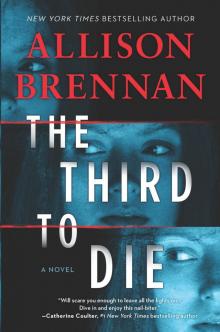 The Third to Die
The Third to Die Nothing to Hide
Nothing to Hide No Way Out
No Way Out Cold as Ice
Cold as Ice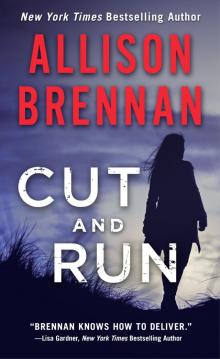 Cut and Run
Cut and Run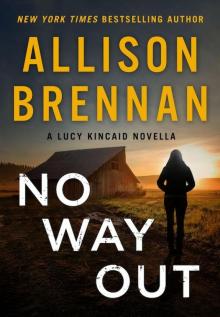 No Way Out (Lucy Kincaid Novels)
No Way Out (Lucy Kincaid Novels) Storm Warning
Storm Warning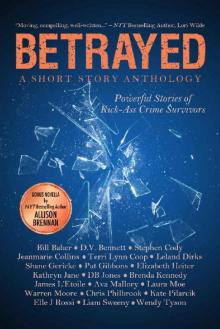 Betrayed: Powerful Stories of Kick-Ass Crime Survivors
Betrayed: Powerful Stories of Kick-Ass Crime Survivors Killing Fear pb-1
Killing Fear pb-1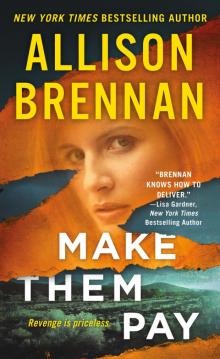 Make Them Pay
Make Them Pay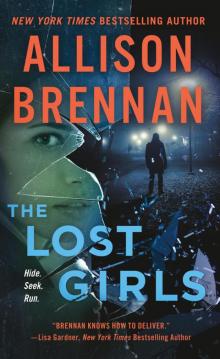 The Lost Girls
The Lost Girls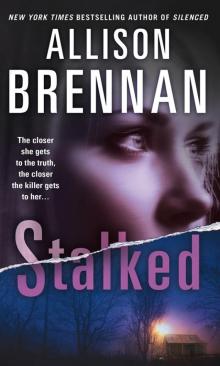 Stalked
Stalked Killing Justice
Killing Justice A Deeper Fear
A Deeper Fear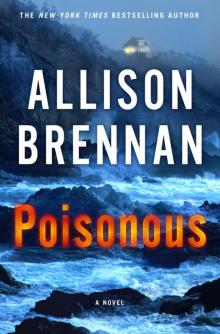 Poisonous
Poisonous Fear No Evil
Fear No Evil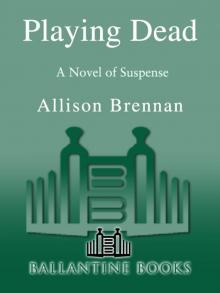 Playing Dead
Playing Dead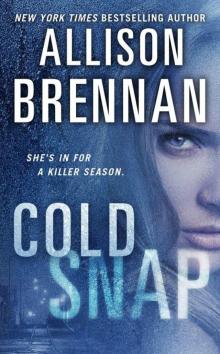 Cold Snap
Cold Snap Vacation Interrupted
Vacation Interrupted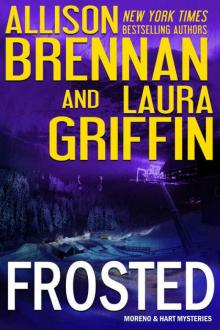 Frosted (Moreno & Hart Mysteries)
Frosted (Moreno & Hart Mysteries)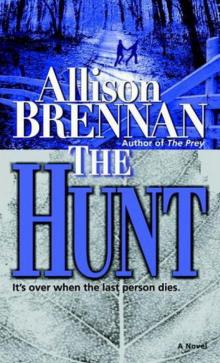 2 - The Hunt
2 - The Hunt Stolen
Stolen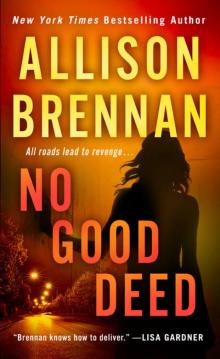 No Good Deed
No Good Deed Cutting Edge
Cutting Edge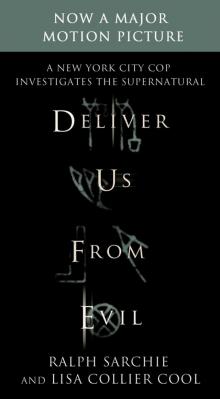 Deliver Us from Evil
Deliver Us from Evil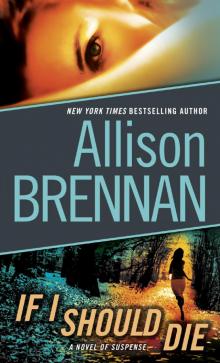 If I Should Die
If I Should Die Speak No Evil
Speak No Evil Silenced lk-4
Silenced lk-4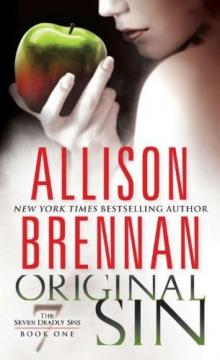 Original Sin sds-1
Original Sin sds-1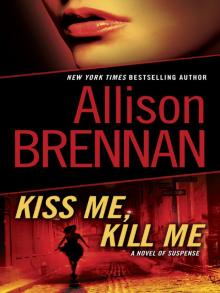 Kiss Me, Kill Me lk-2
Kiss Me, Kill Me lk-2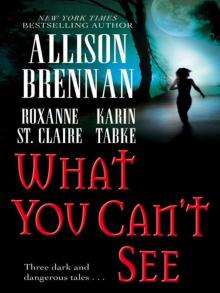 What You Can’t See
What You Can’t See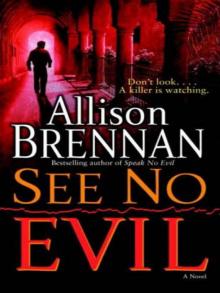 See No Evil
See No Evil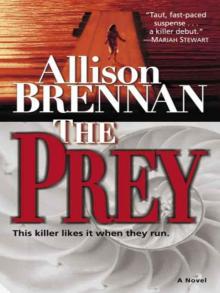 The Prey
The Prey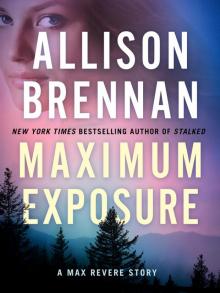 Maximum Exposure
Maximum Exposure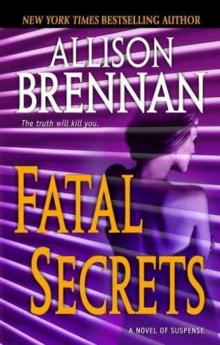 Fatal Secrets f-2
Fatal Secrets f-2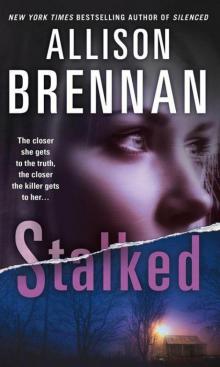 Stalked lk-5
Stalked lk-5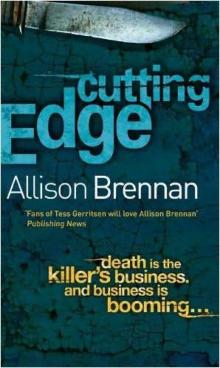 Cutting Edge f-3
Cutting Edge f-3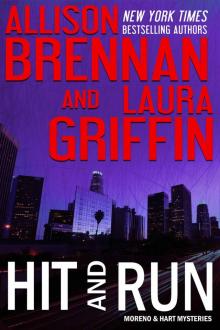 Hit and Run (Moreno & Hart Mysteries)
Hit and Run (Moreno & Hart Mysteries)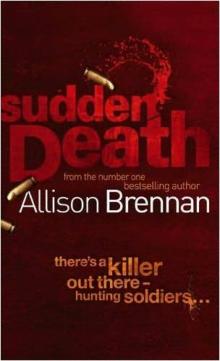 Sudden Death f-1
Sudden Death f-1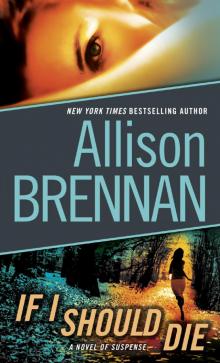 If I Should Die lk-3
If I Should Die lk-3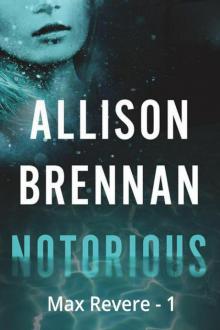 Notorious
Notorious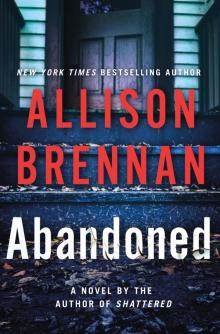 Abandoned
Abandoned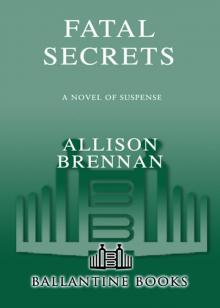 Fatal Secrets
Fatal Secrets The Hunt
The Hunt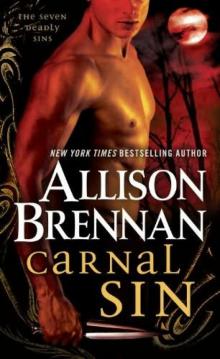 Carnal Sin sds-2
Carnal Sin sds-2 Love Is Murder
Love Is Murder Lost and Found
Lost and Found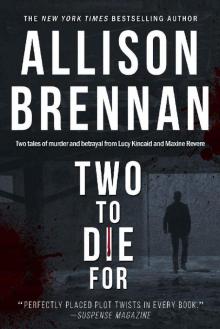 TWO TO DIE FOR
TWO TO DIE FOR Breaking Point
Breaking Point Best Laid Plans
Best Laid Plans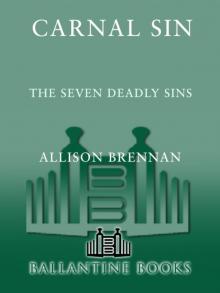 Carnal Sin
Carnal Sin Silenced
Silenced Dead Heat
Dead Heat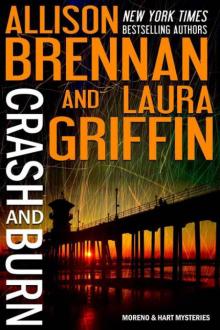 Crash and Burn
Crash and Burn Sudden Death
Sudden Death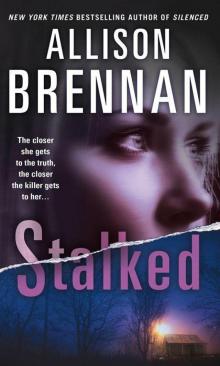 Lucy - 05 - Stalked
Lucy - 05 - Stalked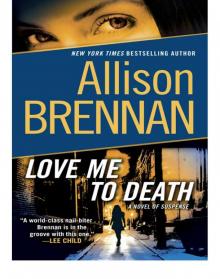 Mortal Sin
Mortal Sin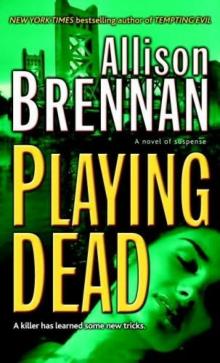 Playing Dead pb-3
Playing Dead pb-3 Kiss Me, Kill Me
Kiss Me, Kill Me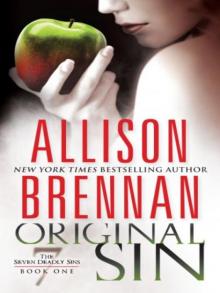 Original Sin: The Seven Deadly Sins
Original Sin: The Seven Deadly Sins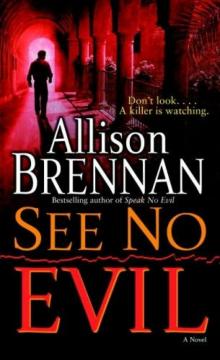 See No Evil e-2
See No Evil e-2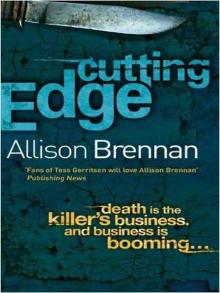 Cutting Edge: A Novel of Suspense
Cutting Edge: A Novel of Suspense Original Sin
Original Sin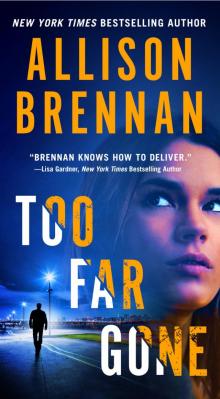 Too Far Gone
Too Far Gone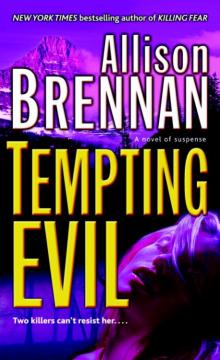 Tempting Evil
Tempting Evil Shattered
Shattered Killing Fear
Killing Fear Murder in the River City
Murder in the River City Love Is Murder (lucy kincaid)
Love Is Murder (lucy kincaid)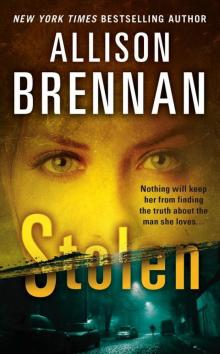 Stolen (Lucy Kincaid Novels)
Stolen (Lucy Kincaid Novels)